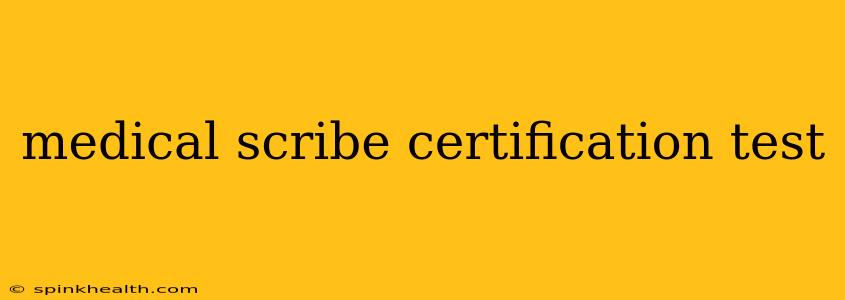The hum of the fluorescent lights, the nervous flutter in your stomach – you’re about to take your medical scribe certification test. This isn't just another exam; it's the culmination of hard work and dedication, a stepping stone to a fulfilling career in healthcare. But what exactly can you expect? This isn't just about acing the test; it's about understanding the path to becoming a successful medical scribe. Let's dive in.
What's on the Medical Scribe Certification Test?
The content of a medical scribe certification exam varies depending on the certifying organization. However, some common themes almost always appear. Expect questions covering:
-
Medical Terminology: This is foundational. You'll need a solid grasp of prefixes, suffixes, roots, and common medical terms. Think about the difference between "hypertension" and "hypotension," or "tachycardia" and "bradycardia." Knowing these is crucial for accurate note-taking.
-
Anatomy and Physiology: A basic understanding of how the human body works is essential. You won't need to be a doctor, but you should be familiar with major organs, systems, and their functions. Knowing where the spleen is located, or the difference between the right and left lung, will make a huge difference.
-
Electronic Health Records (EHR) Systems: Familiarity with various EHR software is critical. Many tests will cover navigation, data entry, and the general workflow within these systems. Each system has its nuances, so practical experience is key.
-
Medical Documentation and Charting: This section focuses on proper medical record keeping. You'll need to understand different documentation styles, including SOAP notes (Subjective, Objective, Assessment, Plan), and the importance of accurate and concise entries. Remember, legibility and clarity are paramount.
-
Medical Abbreviations and Acronyms: The medical field is full of them! From "CBC" (complete blood count) to "NPO" (nothing by mouth), knowing these common abbreviations is vital for efficient note-taking. Mastering this will speed up your workflow.
-
HIPAA Compliance and Medical Ethics: Protecting patient privacy and upholding ethical standards are crucial. The exam will test your understanding of HIPAA regulations and ethical considerations related to patient confidentiality and medical information. This is non-negotiable.
How to Prepare for the Medical Scribe Certification Test?
Preparation is key. Don't underestimate the importance of dedicated study time. Here's a structured approach:
-
Review Course Materials: Thoroughly go through all your course materials, focusing on areas you find challenging.
-
Practice Questions: Work through as many practice questions as possible. This will help you identify weak areas and get accustomed to the exam format.
-
Flashcards: Create flashcards for key terms, abbreviations, and concepts. This is a tried-and-true study method.
-
Study Groups: Collaborating with classmates can enhance understanding and motivation.
-
Simulate Exam Conditions: Practice taking the test under timed conditions to reduce anxiety and improve time management.
What Happens After the Medical Scribe Certification Test?
Once you've passed your exam, congratulations! You've achieved a significant milestone. But the journey doesn't end there. Continuous learning is essential in this rapidly evolving field. Stay updated on the latest medical advancements and technology.
How Long Does the Medical Scribe Certification Last?
The duration of your certification depends on the organization granting it. Some certifications are valid for a specific period (e.g., two years), after which recertification might be required. Always check the requirements of your chosen certifying body.
What are the Different Medical Scribe Certifications?
Several organizations offer medical scribe certifications. Each has its own requirements and examination procedures. Research your options and choose a certification that aligns with your career goals and experience level.
Are there different levels of Medical Scribe Certification?
Depending on the certifying body, there may be different levels or tracks within their certification programs. For example, you might find certifications tailored to specific medical specialties or experience levels. Check the certifying organization's website for details.
This journey isn't just about passing a test; it's about embarking on a career that makes a real difference. With the right preparation and dedication, you're well on your way to becoming a skilled and valued medical scribe. Remember, your hard work will pay off. Good luck!

